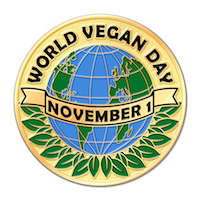 Today is World Vegan Day and the beginning of World Vegan Month. Five years ago, on November 1, 2010, I switched from being a long time vegetarian (nearly 20 years) to a 100% whole foods, plant-based diet. Although it can be challenging at times to follow an organic plant-based diet, it is so much easier now than even five years ago. Here are five reasons why I continue to follow this plant-based diet and lifestyle:
Today is World Vegan Day and the beginning of World Vegan Month. Five years ago, on November 1, 2010, I switched from being a long time vegetarian (nearly 20 years) to a 100% whole foods, plant-based diet. Although it can be challenging at times to follow an organic plant-based diet, it is so much easier now than even five years ago. Here are five reasons why I continue to follow this plant-based diet and lifestyle:
1. Health:
Scientific studies continue to support the benefits of a whole food, plant-based diet. Just last week the World Health Organization’s International Agency for Research on Cancer cautioned “the consumption of red meat as probably carcinogenic to humans and processed meat as carcinogenic to humans.” A whole food, plant-based diet has helped people reverse cancer – see my brother-in-law’s story about beating prostate cancer – as well as reverse heart disease and Type 2 diabetes. I have a family history of cancer, heart disease, stroke and diabetes, so I take comfort in knowing I’m doing what I can through my diet, regular exercise, plenty of sleep and daily meditation to reduce my risk of chronic health problems.
2. Environment:
Numerous studies have also demonstrated that adopting an organic, whole food plant-based diet is better for our planet. According to a study in the UK published last year, “The production of animal-based foods is associated with higher greenhouse gas (GHG) emissions than plant-based foods.“ As far back as 2006, the United Nations Food and Agriculture Organization reported that “…the livestock sector generates more greenhouse gas emissions as measured in CO2 equivalent – 18 percent – than transport. It is also a major source of land and water degradation.”
3. Sustainability:
We now have 7 billion people on the planet and it’s expected that the population will exceed 8.4 billion by 2030. The demand for food, especially for meat and dairy products in wealthier nations, is stretching our resources to the limit. We can feed more people by focusing land, water and energy on the production of plant-based foods. A study published in 2014 in The American Journal of Clinical Nutrition called Sustainability of plant-based diets: back to the future states “environmental data are rapidly accumulating on the unsustainability of current worldwide food consumption practices that are high in meat and dairy products” and “decreasing consumption of meat and other animal products will free up large amounts of food that could be consumed directly by humans—for example, soy and grains.”
4. Animal welfare:
It is comforting to me to know that I can thrive happily on a plant-based diet in which no animals are raised in confining conditions or are injured or killed.
5. It’s more socially acceptable. As more people adopt a vegan, whole food, plant-based diet and lifestyle, industry is taking note. It is easier to find grocery items that are vegan, such as milk alternatives, Just Mayo vegan mayonnaise and a variety of meat alternatives and tofu products. In fact, Bill Gates just invested $108 million in a plant-based food startup called Impossible Foods. Even General Mills can’t let this vegan trend go unnoticed as this article indicates: General Mills to Refocus on Veganism and Startups.
More and more restaurants have clearly marked vegan items on their menus or if not, the chefs are happy to whip up a custom vegan entree. Just last week, I dined at one of my favorite completely vegan restaurants – Crossroads Kitchen in Los Angeles. No sightings of Ellen DeGeneres or Jared Leto, however.
So happy world vegan day! If you are interested in learning more about the benefits of adopting an organic, whole food, plant-based diet, visit our resources and recipes at www.plant-based4health.com or drop me a note.

Great article! I just finished October Unprocessed and shifted toward making my own bread and cooking whole foods. This is a great inspiration for me to now go vegan, which I’ve been circling for years.
Happy 5th and 25th Year Anniversaries! And thanks for helping me go plant-based again.
Also, I’m thrilled to hear that ever-bigger names are finally jumping in, for the good of all. 🙂